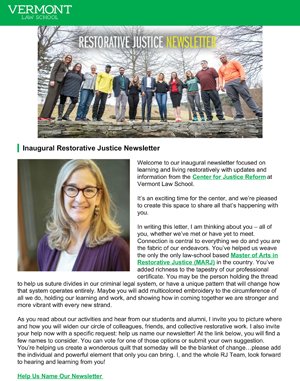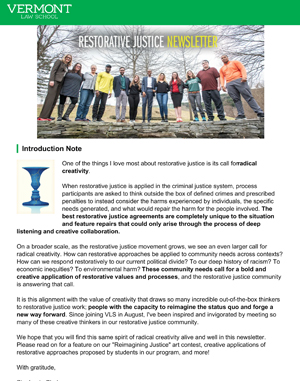Nationally recognized legal scholars Oliver Houck of Tulane and Dave Owen of UC Hastings will be joined by state and federal officials, practitioners and environmental advocates to examine the latest developments in Clean Water Act regulations during a symposium sponsored by the Vermont Journal of Environmental Law (VJEL), from 8 a.m. to 5:30 p.m. Friday, Oct. 23, at Vermont Law School.
During the daylong symposium, titled "TMDLs 2.0: Charting a Course for Clean Water," keynote speakers and panelists will discuss cutting-edge litigation, key court decisions, and the impact of Total Maximum Daily Load (TMDL) regulations on water quality. TMDL refers to the maximum amount of a pollutant that a body of water can hold and still meet water quality standards.
"We are excited to have a group of experts from all over the country discuss a number of topics related to water quality," said VJEL Symposium Editor Kelsey Eggert '16. "This includes discussion of local issues involving Lake Champlain as well as challenges in protecting large watersheds like the Gulf of Mexico and the Chesapeake Bay. The speakers' different backgrounds and perspectives will provide a full view of TMDLs, their effects and potential alternatives."
Eggert and fellow VJEL editors will present several sessions: "TMDLs for Dummies," a primer with Professor Patrick Parenteau, senior counsel at the Environmental and Natural Resources Law Clinic (ENRLC) at VLS; a panel discussion of American Farm Bureau v. EPA, to cover the scope and effect of the TMDL program in the Chesapeake Bay; "Cutting-Edge Litigation" panels that will discuss recent TMDL cases as well as cases that present novel approaches to addressing impaired waters outside the TMDL framework; and a panel discussion of the Lake Champlain TMDL and the recently enacted Vermont Clean Water Act (H35), which will require substantial investments to reduce phosphorous pollution from agriculture, urban stormwater and other sources.
Panelists include:
American Farm Bureau v. EPA
John Echeverria (moderator), professor of law, Vermont Law School
Jon Mueller, vice president for litigation, Chesapeake Bay Foundation
Richard Schwartz, attorney, Crowell & Moring
Nina Bell, executive director, Northwest Environmental Advocates
Mary Jane Angelo, professor of law, director of Environmental and Land Use Law Program, University of Florida Levin College of Law
Cutting-Edge Litigation I
Jack Tuholske (moderator), professor of law, director of Water and Justice Program, Vermont Law School
Richard A. Smith, attorney, Smith & Lowney
Peter Z. Ford, attorney and advisor, Environmental Protection Agency
Matt Rota, senior policy director, Gulf Restoration Network
Lake Champlain TMDL
Melissa Scanlan (moderator), associate dean, director of Environmental Law Center, Vermont Law School
Deb Markowitz, secretary, Vermont Agency of Natural Resources
Chuck Ross, secretary, Vermont Agency of Agriculture, Food, and Markets
Stephen Perkins, director, Office of Ecosystem Protection, Environmental Protection Agency Region I
Chris Kilian, vice president, Conservation Law Foundation
David Mears, professor of law, director of Environmental and Natural Resources Law Clinic at Vermont Law School, former commissioner of Vermont Department of Environmental Conservation
Cutting-Edge Litigation II
Laura Murphy, professor of law, associate director of Environmental and Environmental and Natural Resources Law Clinic, Vermont Law School
Charlie Tebbutt, attorney, Law Offices of Charlie Tebbutt
Debora Kristensen, attorney, Givens Pursley
Jerry Anderson, professor of law, Drake University Law School
In addition to the panels, Professor Dave Owen of UC Hastings School of Law and Professor Oliver Houck of Tulane Law School will deliver morning and afternoon keynote addresses.
"TMDLs 2.0: Charting a Course for Clean Water" is free and open to the public and press. For more information about the symposium, including a full schedule, registration and continuing legal education (CLE) credit, visit eventbrite or Facebook, or email kelseyeggert@vermontlaw.edu. The symposium includes lunch for those guests who register by Friday, Oct. 16.
The Vermont Journal of Environmental Law's mission is to provide an accessible forum to discuss contemporary environmental legal issues. VJEL publishes articles authored by academics, practitioners, and students alike. In selecting articles, VJEL editors recognize that environmental issues are inexorably linked with many other areas of law and seek to encompass a broad range of viewpoints and attitudes. In addition to publishing quarterly issues and hosting symposiums, VJEL reaches national audiences through its annual Top 10 Environmental Watch List. For more information about the Vermont Journal of Environmental Law, visit vjel.vermontlaw.edu.
###
Vermont Law School, a private, independent institution, is home to the nation's largest and deepest environmental law program. VLS offers a Juris Doctor curriculum that emphasizes public service; three Master's Degrees—Master of Environmental Law and Policy, Master of Energy Regulation and Law, and Master of Food and Agriculture Law and Policy; and four post-JD degrees —LLM in American Legal Studies (for foreign-trained lawyers), LLM in Energy Law, LLM in Environmental Law, and LLM in Food and Agriculture Law. The school features innovative experiential programs and is home to the Environmental Law Center, South Royalton Legal Clinic, Environmental and Natural Resources Law Clinic, Energy Clinic, Food and Agriculture Clinic, and Center for Applied Human Rights. For more information, visit www.vermontlaw.edu, find us on Facebook, and follow us on Twitter.


















